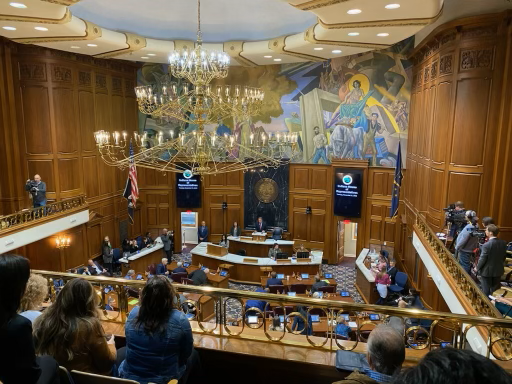
The Indiana General Assembly will reconvene on Jan. 8 for the start of the 2024 legislative session. IHA identified a proactive agenda for the 2024 legislative session based on the feedback of members and the direction of the IHA Board. IHA Vice President of Government Relations Trent Fox sat down with Harmony editor Natalie Russell to discuss priority legislation for Indiana hospitals heading into this year’s non-budget session, which will adjourn mid-March. Below is a preview of some legislative issues IHA and other industry leaders plan to tackle at the Indiana Statehouse over the next few months.
Q: What will be the top legislative agenda items for Indiana hospitals next session?
A: The cost of health care has been an issue that lawmakers, at every level, have been focused on for several years. IHA’s members have been strong supporters of measures enacted in previous years to improve transparency in pricing for consumers. We have partnered with the Indiana General Assembly to implement many initiatives, such as good faith estimates for patients, elimination of surprise medical billing, and the establishment of the All-Payer Claims Database (APCD). Looking to the 2024 legislative session, our top priority is the first step in modernizing Indiana’s Medicaid system, specifically looking at the Hospital Assessment Fee (HAF) program. The HAF is an assessment paid by Indiana hospitals to leverage federal funds to increase Medicaid reimbursement. The HAF program also helps fund the entirety of the Healthy Indiana Plan for Hoosier citizens, alongside a portion of the cigarette tax. IHA’s proposal for the upcoming session is to update the HAF program to allow hospitals to be assessed up to the federally allowable maximum to increase the overall benefit of the HAF program and protect access to quality care across the state. Understanding that an increase in Medicaid base reimbursement rates is not possible outside of a budget session, we carefully crafted a proposal for the 2024 session to update the HAF program so it will not require any new state funding to secure additional federal dollars for reimbursement. In addition to protecting access, our proposal will help reduce the cost shift to commercial insurance. We look forward to partnering with policymakers to protect access to care at no cost to the state under this proposal while helping to reduce the cost shift paid for by employers and consumers.
Q: How will IHA continue to support workforce issues for caregivers in Indiana hospitals?
A: It is no secret that workforce recruitment and retention are top priorities for the health care industry broadly. IHA championed a significant initiative during the 2022 legislative session that we will continue to build on. The 2022 legislation, referred to as “Nursing Indiana Back to Health,” was a compilation of various measures aimed at expanding the pipeline of nursing educational opportunities to increase the number of Hoosiers who can be trained to enter the workforce. That legislation was a comprehensive way to plan long-term while we advocated successfully for short-term initiatives such as continuing the health care professional registry that was established during the pandemic and reducing barriers for out-of-state practitioners to work in Indiana. We expect legislation to be introduced in 2024 that will build on our previous efforts and are excited to again partner with our educational institutions to responsibly modernize regulations to ensure Indiana can accommodate more Hoosiers who can train and work in the state.
Q: What is the political outlook for hospitals in the coming year?
A: Indiana has been at the center of the national debate surrounding health care costs for several years. We have supported calls from lawmakers for increased transparency and remain committed to reducing the overall cost of health for consumers and businesses. To achieve that goal, however, there needs to be equal accountability for all health care industry stakeholders. We were pleased to see some of the recommendations made by the Health Care Cost Oversight Task Force during the 2023 interim. Although the task force recommended a concerning proposal to insert the legislature into mergers and acquisitions that we contend is unnecessary, it also made significant progress in examining other parties who play a large role in the cost of health care, specifically insurers and pharmacy benefit managers. The recommendations made included the following:
- Specify that employers possess full ownership and control of all aspects of health claims data relating to their covered lives. (“Health” is defined as medical, pharmacy, dental, vision, and all other health services.)
- Allow an employer to obtain an audit conducted by a third party without any audit restrictions of the employer's health claims and provider payment data relating to their covered lives, not more than quarterly. Third-party administrators, insurers, and pharmacy benefit managers shall not charge a fee for an audit conducted by a third party. (“Health” is defined as medical, pharmacy, dental, vision, and other health services.)
- Prohibit spread pricing by pharmacy benefit managers, third-party administrators, and insurers.
- Expand IC 27-1-37.5-11, requiring an explanation of why a request for prior authorization was denied, to apply to additional health insurance plans.
- Require a pharmacy benefit manager, third-party administrator, employee benefit consultant, and an insurance broker to act as a fiduciary for the group plan sponsor being represented.
Time will tell if the above recommendations make it into filed legislation, but it is encouraging to see lawmakers expand their scope to evaluate a broader view of health care costs. Indiana’s consumers and employers cannot continue to carry the burden of increasing insurance premiums, especially during challenging economic periods. For some time, states have been hindered by the broad interpretation of ERISA, a federal law that has served as a shield for insurers, protecting them from state-specific regulations. We continue to communicate to our federal delegation that they need to restore the rights of states to reclaim their authority in regulating their health care industry participants. Hoosiers deserve to see the full picture of what goes into the amount they pay for health care. We are encouraged that some light is beginning to shine on other areas of the health care industry and will continue to work on policies that put more power in the hands of consumers while protecting access to quality care around the state.
